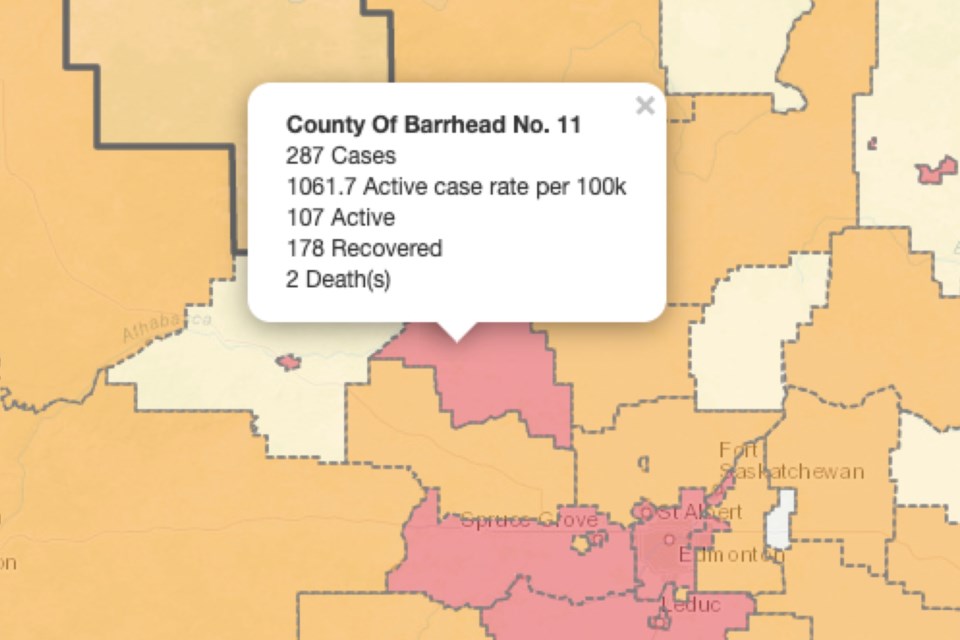Because of the variance in local COVID-19 numbers, the new regional health restrictions announced today will have differing impacts on the County of Barrhead and its two immediate neighbours to the west and south, Woodlands County and Lac Ste. Anne County.
Just after 6 p.m. tonight, Premier Jason Kenney announced that there will be new health restrictions taking effect this week for all municipalities and areas with more than 50 active cases per 100,000 people and at least 30 or more active cases.
As of 5 p.m. on May 4, the County of Barrhead currently has 107 active cases of COVID-19 and one of the highest active case rates per 100,000 residents in the province (1061.7 cases per 100K).
Meanwhile, Woodlands County only has three active cases of COVID-19 (not including the 107 active cases that have been identified in the Town of Whitecourt), while Lac Ste. Anne County has 29 active cases. As such, restrictions in those municipalities will be somewhat lighter than in the County of Barrhead.
First off, Kenney announced that all K-12 schools across the province will be closed for the next three weeks, with students transitioning to at-home learning from Friday, May 7 to Tuesday, May 25.
“I know this is a real disruption for both kids and parents, but with the current level of community spread, we have 80,000 students and staff that are in self-isolation, and we will soon reach a point where many schools will be unable to operate,” he said.
Other restrictions that will affect the County of Barrhead starting on May 5 include a prohibition on outdoor gatherings of more than five people, which is a decrease from the previous 10-person limit. (Indoor gatherings are already prohibited.)
Any workplace that has an outbreak of three or more cases, with the exception of work camps and essential/critical services, will be required to close for 10 days. Other workplaces are required to close unless employees are required to be physically present and employees must wear masks indoors.
Regulated and non-regulated health services like dentists, physicians, massage therapists and kinesiologists can remain open by appointment only. Indoor fitness will be required to shut down.
Retail shops will be required to limit customer capacity to 10 per cent of fire code occupancy or a minimum of five customers. Hotels and motels can stay open but pools and recreation facilities must close.
Faith services at places of worship will also be limited to 15 people, as will funerals.
Then, at 11:59 p.m. on May 9, in-person dining on patios will be prohibited and only take-out or delivery services from restaurants and bars will be allowed. Hair salons, barbers, nail salons, tattoos and piercing parlors must shut down by this time as well.
Regulated and non-regulated health services like dentists, physicians, massage therapists and kinesiologists can remain open by appointment only.
Finally, all outdoor sports and recreation will be prohibited except activities that only involve members of your household. That means no team sports, fitness classes, one-on-one lessons or practices and games.
As noted earlier, the restrictions will be different for Lac Ste. Anne County and Woodlands County if the numbers stay low. While indoor fitness is prohibited in those municipalities, residents will be allowed to have outdoor social gatherings of up to 10 people and hold funeral services of up to 20 people, and the other more severe restrictions will not be in effect.
Kenney also announced that the fine for breaking health restrictions will be doubled from $1,000 to $2,000 and there will be tougher enforcement protocols put in place to handle repeat offenders.
In his opening comments, Kenney said the province has generally sought to protect lives and livelihoods by resisting pressure to implement widespread and long-term lockdown measures.
“Governments must not impair people’s rights or their livelihoods unless it is absolutely necessary to save lives, and in this case, prevent disaster from unfolding in our hospitals. Unfortunately, that is the situation we are facing today,” he said.
Despite 64 per cent of Albertans over 50 having received at least one dose of vaccine, the arrival of highly transmissible variants has put immense pressure on the health care system, Kenney said, noting that there are 671 Albertans in hospital right now with COVID-19, 150 of which are in intensive care.
While Alberta has the surge capacity to open as many as 425 ICU beds, that would require mass cancellations of surgeries and other care that Albertans rely upon, Kenney noted.
“Let me be clear: we will not permit our health care system to be overwhelmed. We must not, and we will not force our doctors and nurses to decide who gets care and who doesn’t. And that’s why we must act now to stop the spike.”



.jpg;w=120;h=80;mode=crop)